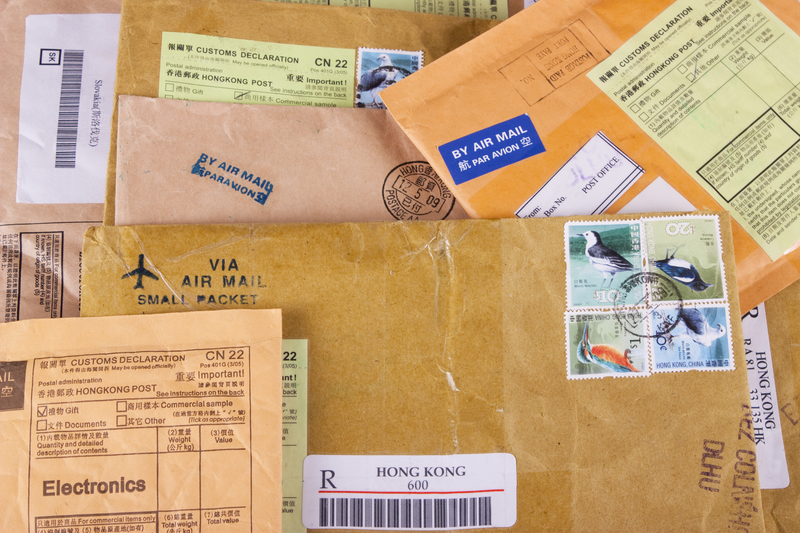I am fully aware of the new international shipping regulations
everything you need to know about international shipping
The year 2020 has started a bit less rosy for many online retailers. The Universal Postal Union (UPU), an organization that coordinates postal policy worldwide, has tightened the rules for international shipping of goods abroad for security reasons. The result: As of January 1, it is no longer allowed to send goods as letter mail to worldwide destinations. But that is not all, also the Incoterms from 2010 have been changed to Incoterms 2020.
What exactly is it and what is changing in the international delivery machine?
new regulations: what does this mean exactly?

Previously it was possible to send all goods that fit through the letterbox worldwide with letter mail without track and trace. This is no longer allowed under the new regulations and a strict distinction must be made between sending documents and goods. This means that all goods shipments that are shipped outside the EU must have a shipping label with a barcode. In concrete terms, this means that everything that is not a letter automatically falls under the category 'product' and must therefore be sent as a package. This makes the rule of thumb 'as long as it fits in an envelope, a suitable stamp is sufficient' final passé.
** PLEASE NOTE: this new regulation only applies to webshops that send products in envelopes, nothing changes for sending packages abroad.
THE QUESTION BEHIND THE QUESTION: WHY?
Changing or focusing rules usually happens for a reason, the reason for these changed regulations is in the interest of safety. After all, countries are increasingly strict on goods entering their country. Due to the fact that letter-post items or envelopes with postage stamps are not registered as goods, countries are unable to perform this check accurately and therefore lose their grip. This immediately reveals the biggest problem. To enhance security, all goods shipped worldwide must first be digitally pre-notified and content information must be shared prior to sharing. This allows countries to determine in advance what they will and will not accept. However, the new policy also has its advantages: because customs can assess the data beforehand, this will make the delivery machine and the customs process run more smoothly, which in turn will prevent a lot of delayed shipments.
increased rates
Due to the new regulations, all postal companies are worldwide forced to go along with this and thus differentiate between letters and goods, resulting in higher shipping costs. Online stores that want to send small goods abroad will now have to stamp them as a package. Where you previously had to pay shipping costs for a shipment of 100 grams within the EU letter post, you now pay a considerably higher parcel rate for the same shipment.
crooked proportions
For companies that regularly send small, easily accessible goods abroad, this rate increase is particularly hard. They see the profit margins evaporate before their eyes. The proportions become quite skewed if you sell shoelaces or key chains where the shipping costs are higher than the product itself.

everything you need to know about incoterms
Incoterms play a major role in the international shipment of goods. These international trade rules establish the reciprocal obligations between the buyer and seller. This automatically regulates who is responsible for shipping, insurance, import and customs costs. If you are going to ship products outside the EU, you must put the Incoterms on your commercial invoice.

Although the 11 current Incoterms of 2010 will all remain in force, a number of safety-related requirements have been added for the obligations regarding transport and the associated costs of transport. In addition, in this new version there are four main changes in content compared to the Incoterms of 2010. As of January 2020, 1, the Incoterms 2020 are the new worldwide standard for (inter) national sales.
the main changes in a nutshell
that will be dpu
The abbreviation for Delivered at Terminal (DAT) has been changed to DPU (Delivered at Place Unloaded). This is to indicate more emphatically that goods can not only be delivered to a terminal, but this is also possible at another point such as a factory or warehouse. The only condition is that it must be a place where the goods can be unloaded.


dap, dpu, ddp and fca: the buyer can arrange the transport himself
It is now possible for the buyer to arrange the transport of goods with his own means of transport at Delivery at Place (DAP), Delivery at Place Unloaded (DPU), Delivery Duty Paid (DDP) and Free Carrier (FCA). This shifts the responsibility from the seller to the buyer.
at fca the b / l may also go to the seller
The Bill of Lading (B / L) is proof that goods have been loaded on board. With the Incoterm Free Carrier (FCA) this Bill of Lading (B / L) was always handed over to the buyer, but this has now changed. As of January 1, 2020, the sales agreement may stipulate that the B / L is issued to the seller. This eliminates the risk of unexpected cancellation of the transport and gives the seller more payment security.


cip and cif contain broader insurance coverage
Under the 2010 Incoterms, the options for transport insurance were still fairly limited. In the new Incoterms, insurance has expanded and now provides different levels of insurance coverage under Cost Insurance and Freight (CIF) and Carriage and Insurance Paid (CIP). For example, the seller is obliged at CIP to insure the shipment with a high coverage. CIF has an insurance obligation with a minimum coverage.
do you have any doubts? let us advise you
Do you already sell products outside the EU? Or are you planning to ship internationally soon, but are you still unsure which shipping option to use? Do not hesitate any longer and let us advise you! With our wide range of international carriers, there is always a carrier that suits you perfectly.
Do you want to become an expert in international shipping in no more than five minutes? You will find everything you need to help your shipments pass customs without any problems here.


